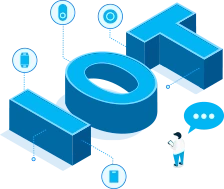في العالم الحديث, التواصل الفعال أمر بالغ الأهمية لأي عمل أو منظمة للعمل بسلاسة. يعد اختيار وضع الاتصال الصحيح للتطبيقات المختلفة أمرًا بالغ الأهمية. With the emergence of new technologies, communication modes such as Bluetooth and واي فاي are becoming increasingly popular. This article aims to compare WiFi Beacon and Bluetooth Beacon, and then help customers understand which technology is better suited for their needs.
WiFi Beacons vs Bluetooth Beacons
WiFi beacons and Bluetooth beacons are both wireless communication technologies that transmit signals over short distances. ومع ذلك, they differ in several aspects, including range, استهلاك الطاقة, معدل نقل البيانات, interference and reliability, الأمان, كلفة, compatibility with different devices and platforms, ease of deployment, اعمال صيانة, offline access, use cases, والتطبيقات. The table below highlights some of the main differences between WiFi beacons and Bluetooth beacons.
| Factors | منارات بلوتوث | WiFi Beacons |
|---|---|---|
| Range and Coverage area | 10-100 أمتار | 50-100 أمتار |
| استهلاك الطاقة | منخفض | عالٍ |
| Data Transfer rate | منخفض | عالٍ |
| التشوش & إمكانية الإعتماد على | معتدل | عالٍ |
| الأمان | يؤمن | أقل أمنا |
| كلفة | بسعر معقول | Expensive |
| Compatibility with different devices and platforms | عالٍ | منخفض |
| Ease of deployment and maintenance | سهل | Difficult |
نطاق: Bluetooth beacon has a range of 100 أمتار, which is double the range of a WiFi beacon. This makes Bluetooth beacons suitable for applications that require longer-range communication.
Location Accuracy: Owing to the high power levels of WiFi signals and the dispersion of WiFi access points, WiFi access points rarely provide good indoor positioning precision (+/-1م), in contrast to Bluetooth Beacons. The accuracy is rarely better than +/-10m and frequently closer to +/-15m, even in the best circumstances. Bluetooth beacon is more suitable for applications that require higher location accuracy.
استهلاك الطاقة: Bluetooth beacon has lower power consumption compared to WiFi beacon. This makes Bluetooth beacons more suitable for battery-powered applications.
معدل البيانات: Bluetooth beacon has a data rate of 1Mbps, while WiFi beacon has a data rate of 2-866Mbps. WiFi beacon is more suitable for applications that demand high-speed data delivery.
وقت الإستجابة: Bluetooth beacon has a latency of 100-300 السيدة, while WiFi beacon has a latency of less than 100 السيدة. WiFi beacon is more suitable for applications that require low-latency communication.
تكرر: Both Bluetooth and WiFi beacons operate at the 2.4GHz frequency band. ومع ذلك, the WiFi beacon can also operate at the 5GHz frequency band.
كلفة: While the price of routers typically varies by manufacturer, WiFi beacons with high-traffic routers are relatively more expensive than Bluetooth beacons. This makes Bluetooth beacons more suitable for cost-sensitive applications. من ناحية أخرى, beacons can be purchased for as little as $2–3 per unit. بالإضافة إلى, if you get a beacon that is powered by electromagnetic waves or by USB rather than batteries, you can save time and money by not having to deal with the hassle of having to change the batteries on a regular basis.
الأمان: Both Bluetooth beacons and WiFi beacons provide high-level security capabilities, including encryption and authentication.
التشوش: Bluetooth beacon technology has lower interference compared to WiFi beacon. This makes Bluetooth beacon devices more suitable for applications that require low-interference communication.
Device Compatibility: WiFi beacon has limited device compatibility compared to Bluetooth beacon. Bluetooth and WiFi ranges are both supported by Android. ومع ذلك, iOS does not support WiFi, only Bluetooth ranging. Because of that, the positioning will be hard and incorrect for WiFi beacons without ranging. Bluetooth beacons can work with almost all devices that have Bluetooth capabilities.
Offline access: Bluetooth beacons enable functions like navigation, messaging, and notifications without the need for an internet connection. Wi-Fi, من ناحية أخرى, needs the internet to be located. When several users are logged into the same network, Wi-Fi may occasionally become overwhelmed. و لهذا, it becomes unstable and disruptive for services that provide inside positioning or indoor navigation. بالإضافة إلى, solid objects cannot be penetrated by Wi-Fi transmissions.
Applications of WiFi beacons and Bluetooth beacons
Though WiFi beacons and Bluetooth beacons share some common use cases and applications, there are some differences in their applications.

WiFi beacons are often used for applications that require internet connectivity and larger coverage areas. They are useful in environments such as hotels, المطارات, large retail stores, ومراكز التسوق. WiFi beacons can be used for location-based services, الملاحة الداخلية, real-time customer engagement, وتحليلات البيانات.
منارات بلوتوث, من ناحية أخرى, have a shorter range than WiFi beacons and are useful in environments that require greater accuracy in determining the location of the user, or tracking of proximity such as indoor tracking, التسويق عن قرب, مدفوعات المحمول, تتبع الأصول, and real-time location services.
شاملة, the key difference between WiFi and Bluetooth beacons is based on the range, precision, and application requirements. WiFi beacons are better suited to provide data analysis, while Bluetooth beacons are best used for proximity-based applications.
Factors to Consider When Choosing Between Bluetooth Beacons and WiFi Beacons
When choosing between BLE beacons and WiFi beacons, عدة عوامل تحتاج إلى النظر فيها, including the type of application and use case, environmental factors, device compatibility and availability, budget and cost-effectiveness, required data transfer rate and accuracy, security and privacy concerns, and deployment and maintenance considerations.
Type of application and use case: If the application requires high data transfer rates, WiFi beacons would be the better option. Bluetooth beacons are best suited for indoor navigation and proximity marketing.
العوامل البيئية: WiFi beacons are more susceptible to interference than Bluetooth beacons. وبالتالي, they are better suited for outdoor applications.
Device compatibility and availability: Bluetooth beacons are compatible with most devices, including smartphones and tablets. من ناحية أخرى, WiFi beacons require devices with WiFi connectivity.
Budget and cost-effectiveness: Budget and cost-effectiveness are also important considerations when choosing between Bluetooth and WiFi beacons. Bluetooth beacons are relatively inexpensive, making them a better choice for small businesses and startups. ومع ذلك, WiFi beacons offer higher data transfer rates and are more reliable, making them a better option for larger organizations.
Required data transfer rate and accuracy: WiFi beacons offer higher data transfer rates and are more accurate than Bluetooth beacons. وبالتالي, they are better suited for applications that require high data transfer rates and accuracy.
Security and privacy concerns: Bluetooth beacons offer better security features than WiFi beacons, making them a better option for applications that require high levels of security.
Deployment and maintenance considerations: Bluetooth beacons are relatively easy to deploy and maintain, and those using BLE are independent. في الواقع, they can operate for more than two years on a single battery, and the beacon itself doesn’t need to be configured. ومع ذلك, WiFi beacons require more complex setup and maintenance. وبالتالي, if the application requires frequent changes or updates, Bluetooth beacons would be the better option.
Integration of WiFi Beacons and BLE beacons
It is also possible to combine تقنية البلوتوث and WiFi technology to create a hybrid approach that leverages the strengths of both technologies. One of the common integrations is to use WiFi beacons for detecting the presence of users in a particular area and then using Bluetooth beacons to track and engage with them in close proximity. فمثلا, a shopping mall might use WiFi beacons to detect when a customer enters the mall and then use Bluetooth beacons to guide them to specific stores or products within the mall for proximity marketing. Another example of integrating both technologies is using WiFi beacons to monitor and gather data about foot traffic, and then using Bluetooth beacons to push notifications or deals to customers who are within close proximity.
علاوة على ذلك, WiFi and Bluetooth beacons can work together to enhance location accuracy in indoor environments. WiFi beacons can provide a general idea of the user’s location, and Bluetooth beacons can pinpoint the location of the user with greater precision.

في تلخيص, the integration of WiFi beacons and Bluetooth beacons can enhance the overall user experience and provide more extensive location-based services. Their combined functionality can enable businesses to better understand user behavior and improve marketing campaigns by targeting audiences with precision.
ومع ذلك, integrating different communication modes also presents challenges and limitations, such as compatibility issues, complex setup and maintenance, and higher costs. وبالتالي, it is essential to carefully consider the advantages and disadvantages of each technology before implementing a hybrid approach.
Mokosmart’s Bluetooth Beacon Solutions
Mokosmart is a leading provider of منارة بلوتوث حلول. We specialize in the development and manufacturing of Bluetooth beacons for various applications, including indoor navigation, التسويق عن قرب, تتبع الأصول, والخدمات القائمة على الموقع. Since they are simple to deploy and maintain, our solutions offer a seamless user experience to our customers.
خاتمة
ختاماً, when choosing between Bluetooth Beacons and WiFi Beacons, it is essential to consider the specific requirements of the application and use case. Both technologies offer various advantages and disadvantages, and a careful evaluation of these factors is necessary to make an informed decision. علاوة على ذلك, the possibility of integrating different communication modes, such as Bluetooth and WiFi, can provide a hybrid approach that leverages the strengths of both technologies. Mokosmart is a reliable partner for Bluetooth beacon solutions, offering high-quality products, custom solutions, دعم فني, and extensive experience in developing and manufacturing Bluetooth beacons. Interested customers are encouraged to contact us for more information and solutions.
Continue Reading About BLE bEACON






























